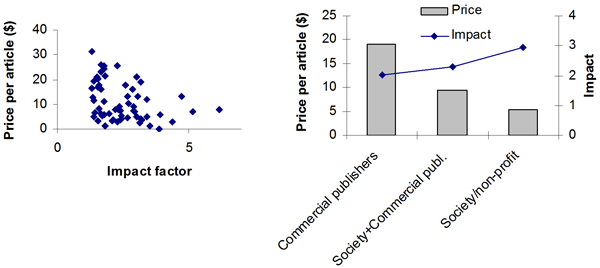By now, everybody reading this obscure blog knows about the so-called sting operation by John Bohannon in Science Magazine last week. As virtually everybody has pointed out, the outcome of this stunt is entirely meaningless.
Yesterday, Science Magazine published a news story (not a peer-reviewed paper) by Gonzo-Scientist John Bohannon on a sting operation in which a journalist submitted a bogus manuscript to 304 open access journals (observe that no toll access control group was used). Science Magazine reports that 157 journals accepted and 98 rejected the manuscript.
Recently, a statement of librarian Rick Anderson has made the rounds: Of course, when you can get the same content for free, why should you pay for it? Apparently, Mr. Anderson does not value the work a publisher has put into their version of a scholarly article enough to pay for it, at least not compared to the author’s copy in the ‘green’ OA repository.
Sven Fund, CEO of the German publishing house de Gruyter was recently interviewed by Richard Poynder in his widely read interview series on open access. In the interview, he first avoided answering the question if de Gruyter had ever lobbied against open access.
Rejection is one of the unpleasant but inevitable components of life. There are positive components to rejection: they build character, they force you to deal with negativity and sometimes they force you to change your life to avoid future rejections.
I just got the nicest decline to review ever: That’s how you retire from science: you get to work like normal people. Awesome!

I’ve just been invited to edit a special issue in the MDPI journal ‘publications’ on a topic I can specify. If I do it, I thought it should revolve around replacing journal rank (i.e., altmetrics, ALM, etc.) and other (technical?) means to transcend a journal-based literature towards a coherent knowledge-dissemination infrastructure that incorporates of course text, but also software and data.
It is one of these rare events when I can post a video of one of my own talks. This one was in Berlin earlier this year, organized by The Lost Lectures in a very unusual venue, the Stattbad Wedding: I’m planning to work more closely together with our computing center here to be able to record at least the lectures I give in English here at the university. So maybe there will be some more videos here, soon.

*During my flyfishing vacation last year, pretty much nothing was happening on this blog. Now that I’ve migrated the blog to WordPress, I can actually schedule posts to appear when in fact I’m not even at the computer. I’m using this functionality to re-blog a few posts from the archives during the month of august while I’m away.

Since the birth of our daughter, we spend our summers in Sweden, just like I used to, when I was little. This not only allows her to get more practice in Swedish then she gets talking with just me or her grandmother, but we also get to really recharge our batteries in the fabulous wilderness up there.